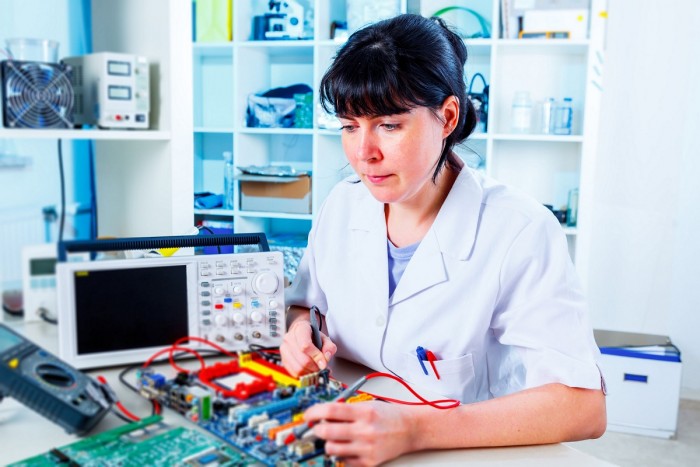Biomedical Technician
Kaihangarau Utauta Whakaora
Alternative titles for this job
Biomedical technicians make, modify, maintain and repair mechanical and electronic medical equipment such as clinical machines, surgical instruments and implants.
Pay
Biomedical technicians usually earn
$58K-$86K per year
Senior biomedical technicians usually earn
$87K-$104K per year
Source: Te Whatu Ora/DHBs, 2022.
Job opportunities
Pay
Pay for biomedical technicians varies depending on their qualifications and experience.
Biomedical technicians working for Te Whatu Ora Health NZ (former DHBs)
- Qualified biomedical technicians usually earn $58,000 to $86,000 a year
- Senior biomedical technicians, who may also supervise staff, can earn $87,000 to $104,000.
Sources: Auckland Region District Health Boards/ PSA, ‘Allied, Public Health, Scientific & Technical Multi Employer Collective Agreement, expires 30 June 2023’, 2022, and District Health Boards/ PSA, ‘Allied, Public Health, Scientific & Technical Multi Employer collective agreement, expires 30 June 2023’, 2022.
- PAYE.net.nz website - use this calculator to convert pay and salary information
- Employment New Zealand website - information about minimum wage rates
(This information is a guide only. Find out more about the sources of our pay information)
What you will do
Biomedical technicians may do some or all of the following:
- advise and consult with medical staff about their equipment requirements
- make surgical equipment and tools
- install and test medical equipment
- examine, maintain and repair equipment
- do quality assurance and electrical safety checks on equipment
- train staff to use equipment and give technical advice and assistance
- help design and develop implants for use during operations – for example, artificial joints.
Skills and knowledge
Biomedical technicians need to have:
- knowledge of medical equipment, its use and care
- knowledge of biomedical technology
- practical skills in mechanics, engineering, electronics and testing equipment
- a basic understanding of physiology and medical terms.
Working conditions
Biomedical technicians:
- work regular business hours, but may be on call
- work in hospital workshops, clinics, and departments.
Entry requirements
To become a biomedical technician you need one of the following:
- New Zealand Diploma of Engineering (in electrical, electronic or mechanical engineering)
- Bachelor of Engineering Technology.
Biomedical technicians who are registered as electrical service technicians must take a refresher course every two years to keep their licence up to date.
Secondary education
NCEA Level 2 is required to enter tertiary training. Useful subjects include biology, construction and mechanical technologies, design and visual communication, digital technologies, mathematics and physics.
Personal requirements
Biomedical technicians need to be:
- careful, methodical, well organised and responsible
- practical and logical
- able to work without direct supervision and show initiative
- customer-focused and mindful of patients' rights and comfort
- good communicators
- skilled at analysis and problem-solving
- good with computers.
Useful experience
Useful experience for biomedical technicians includes:
- work with a medical equipment company
- mechanical, electrical and engineering work
- computer work.
Physical requirements
Biomedical technicians need to have good hand-eye co-ordination and normal colour vision.
Registration
Biomedical technicians who work with electrical and electronic equipment need to be registered with the Electrical Workers Registration Board, or work towards this once they are employed. They also need an annual practising licence.
Experienced biomedical technicians can apply to the Engineering Associates Registration Board to become a registered engineering associate.
- Electrical Workers Registration Board website - information about registration with NZ qualifications
- Electrical Workers Registration Board website - information about the practising licence
- Engineering Associates Registration Board website - information about registration
Find out more about training
- Engineering New Zealand
- 04 473 9444 - hello@engineeringnz.org - www.engineeringnz.org
What are the chances of getting a job?
Demand for biomedical technicians is rising due to:
- experienced staff often leaving for better paid positions overseas
- not enough people training to be biomedical technicians
- an ageing population with more health problems
- increasing use of sophisticated medical devices in the health industry.
Most biomedical technicians work for hospitals
About two-thirds of biomedical technicians work for district health boards. Others work for:
- private hospitals
- equipment suppliers in the private sector.
Sources
- Auckland Bioengineering Institute website, accessed June 2017, (www.abi.auckland.ac.nz).
- Canterbury District Health Board Careers website, accessed June 2017, (www.cdhbcareers.co.nz).
- Counties Manukau Health, '2015 Health Workforce Report', accessed June 2017, (www.countiesmanukau.health.nz).
- Engineering Education to Employment, 'Our Shortfall in ITP-Educated Engineers', June 2017, (engineeringe2e.org.nz).
- Futureintech website, accessed June 2017, (www.futureintech.org.nz).
- IPENZ Engineers New Zealand, 'Demand Drives Surging Salaries for Engineers', accessed June 2017, (www.ipenz.nz).
- Ministry of Business, Innovation and Employment, 'Occupation Outlook Engineering Professionals', accessed June 2017, (www.mbie.govt.nz).
- University of Canterbury Centre for Bioengineering website, accessed June 2017, (www.bioengineering.canterbury.ac.nz).
(This information is a guide only. Find out more about the sources of our job opportunities information)
Progression and specialisations
Biomedical technicians can progress into managerial or biomedical engineering positions.
Last updated 15 March 2024


